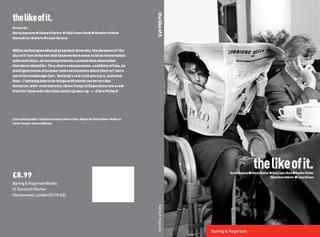
Another day - another anthology. So sighs the world-weary professional poetry editor (I am currently trying to meet a deadline for my sixth anthology, due next week at the publishers in Canada).
And yet, they serve a purpose - they serve notice. They demand that certain poets are noticed.
In Britain, where debut collections are cruelly limited, both by perhaps overly conservative standards, and rigorous market concerns (with less arts funding than, say, in Canada), very few good poets get their own books out, and the battle is always on to draw attention to those who should be so published.
So, this anthology, The Like Of It, promises to highlight with a very strong marker some exceptionally gifted younger poets who - in a just, stylish, poetry-smart and less po-faced society - would all already have first or second books. It is thus a needed as well as superb offering. I should add I know most of these poets, having met them over my last few years in London. I am glad to have met them.
Here's the blurb from the back:
Whilst anthologies often play up their diversity, the pleasure of 'the like of it' lies in the fact that these writers seem to be in conversation with each other, all working towards a mutual idea about what literature should be. They share sensuousness, a subtlety of line, an intelligent sense of humour and a seriousness about their art, born out of the knowledge that: 'Nothing's real until you say it, and even then - / knowing how to do things with words can be terrible.' Inventive, well-read and wise, these Songs of Experience are a real treat for those who like their poetry grown-up. — Clare Pollard
Baring and Rogerson are pleased to invite you to the launch of The Like Of It
an anthology of new poems by
Karen Annesen, Edward Barker, Katy Evans-Bush,
Heather Holden, Simon Rees-Roberts, Liane Strauss
6.30-8.30
Friday, 30 September 2005 (reading at 7.30)
Rebecca Hossack Gallery
35 Windmill Street London W1T 5NQ
Comments